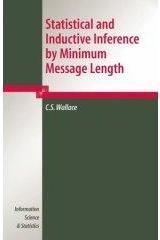At the launch of the MML book: Statistical and Inductive Inference by Minimum Message Length
Monash U., 24 August 2005

It is a bitter-sweet moment to be here at the launch of Chris Wallace's "MML book." A sweet moment because this work is finally in print between hard shiny covers, and a bitter one because he is not here to see it.
Early versions of some chapters were circulated at the International Conference on Information, Statistics and Induction in Science (ISIS) organized by the Department of Computer Science in 1996, and we have been waiting on the book's final form ever since.
The manuscript was essentially complete in early to mid 2004, but it is only recently that I have seen the whole book assembled in its final form. We owe a debt to David Albrecht, Ingrid Zukerman and Judith Wallace for ensuring that it has been put together as Chris wanted. They have done a fine job.
MML research goes back to at least 1968 and continues apace. It is only one of Chris's "really excellent ideas" (when The Age (Education p.6-7) featured Victorian University Research on 20 June 2005, out of 30 entries he scored two, for MML and the Wallace multiplier). I heard about MML by accident -- over lunch in the staff club in about 1990 when it became apparent that MML could be applied to a problem (eventually several problems) in what is now called Bioinformatics. MML is one of the great ideas in science because it is so easy to state and to grasp -- you "get it" in five minutes. All the maths and hard work that follows is in some sense just a rationalization.
My favourite chapter of the book is perhaps the least useful but most thought provoking: chapter 8, The Feathers on the Arrow of Time. Chris warned against "talking to philosophers" but here he is tackling philosophical questions. It is full of insight, fun and humour. For my money it tops Hawking and Penrose any day.
Chris Wallace was a genius which makes the book the work of a genius. I also believe that it is a work of genius. Imagine for a moment that you have just had some idea, of which you are feeling rather proud, in the area of machine learning and statistics. Well if it is a good idea it is probably treated in some subsection here. Chris very likely considered the idea, extended it, worked out the maths, and did the experiments. He was impressive and inspiring, always helpful and generous, in that way.
— Lloyd Allison, 2005.
School of Computer Science and
Software Engineering,
Monash University,
Australia 3800.
Created with "vi (Linux & Solaris)",
charset=iso-8859-1.